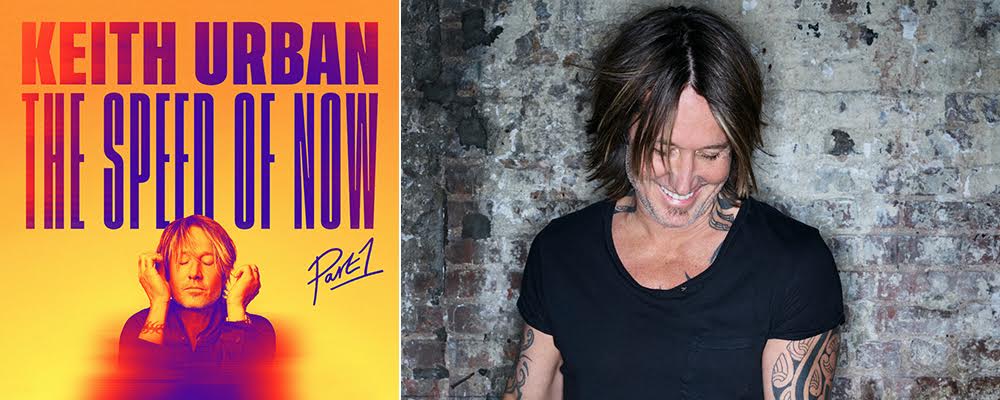Keith Urban Continues to Mold Country Into Pop on ‘The Speed of Now Part 1’
Adi Mehta
Keith Urban has managed to stay at the top for two decades. His last album, 2018’s “Graffiti U,” boldly defied genres, and his latest offering, “The Speed of Now Part 1,” continues in this tradition. Urban ventures into EDM, and switches unabashedly between broad pop flourish and heartland twang, on an album that strikes as a commercial venture from an artist with a silent mastery.
Opener “Out the Cage” nods to the ‘70s as people might have done in the ‘90s, with a ravey backdrop, replete with DJ shout outs and all the works. This is exactly the type of fare that makes country purists kick themselves, for better or worse. None other than Nigel Rogers is on duty, and his spirit shows up in everything from the shuffle of the drums to the overall sheen. Urban sings a melody that might as well be clipped from, say, Justin Timberlake. He switches modes, in a flash, on “One Too Many,” reducing the glitter to a minimal guitar stomp that informs the whole song. P!nk duets with Urban, and sounds just about in her element, with the pair affecting an accessibility with the most blatant gestures, both musically and lyrically. They harmonize, “I spend all my money drinking on my own, yeah / In this bar, just sat here staring at my phone,” and run through cascading R&B digresses.
“Live With” is the first moment when the music gets, at all, country. And Urban might even overcompensate a bit. He curls up his words, puffs up his chin, and rounds off a chorus with a bona fide, heartland, wide-eyed optimism. When he sings, “A life I can learn with, swerve with, twist and turn with,” the free revolutions of his tongue do indeed support the idea at hand. And when it comes to the chorus, he is on standard, country radio duties. The fact that he switches stances so brazenly might be suspect at first hand, but it really just speaks of a versatile artist.
The cowboy hat-wearing, dip-spitting critics of this foolhardy spirit will either have a heart attack or a hearty laugh upon “Superman.” This song has the type of killer chorus that only the most principled madman would aspire for. Apportioned dance crews waiting for your cue, here you are. Wild guitar theatrics back Urban’s vocals, and beneath the layers of sheen, there are even echoes of David Bowie’s “Heroes.” As much as people might complain about Urban’s trendiness, he uses it to his advantage. On “Change Your Mind,” he contourts his voice through the type of “ohs’ and “ohs” that come with an expected routine. There’s surprising depth behind the song. Simply expand on the title.
Having spent the near first half of his album in the most unhinged pop indulgences, Urban returns to his pop country roots, and sounds about as authentically inauthentic as he ever was.. There are siren alarms, walloping guitar solos, rodeo calls, and the rest, by the end of “Change Your Mind.” Surprisingly, he overcompensates for himself on “Forever,” sounding about as natural as an Australian can really be expected to be. It’s a rollicking trick, with lines like “Let the good times roll,” punctuated by an emphatic “Oh Yeah” and a guitar gesture that translates better. It takes an overt pop turn upon “Say Something,” which finds Urban frolicking over a nearly trap beat, and assuming a strained falsetto that goes a bit too far on the chorus.
There have been plenty of songs ringing with the trite whining of Louis Jordan’s “Ain’t That Just Like a Woman.” Urban adds to this repertoire with “Ain’t It Like a Woman,” except that it turns out to be the opposite, upon the climatic line, “Ain’t it like a woman / To save a man.” Upon “With You,” things get rather outrageously pop, with Urban abandoning any palpable signifier of country music and diving into high charts. The chorus is so preampatory that the song becomes a bit of an exercise in self-parody, which is to its credit. “Tumbleweed” starts with banjo, assembles with affected twang, and amounts to about as much as one might expect from the title. The saving grace is Urban’s guitar work, which makes anyone of any sense stop and reconsider.
Urban is as open about his faith as a Southern preacher on “God Whispered Your Name.” A beachside stomp turns into a flashdance phenomenon of sorts. To his credit, Urban puts on a convincing variety of voices. “Polaroid” is a swift pop song, quick and direct, with a driving banjo and a sweaty, mobilizing backroom melody. Urban shifts between modes of elegant, understated singer-songwriter pose and total, glitter pop disregard and abandon.The latter is the case with “Better Than I Am.” Come “We Were,” Urban dons a Southern twang. Regardless, Urban owns it, rounding out the album with “We Were,” featuring Eric Church. The harmonies are priceless, and Church’s verse adds plenty of personality to an album that is elegantly sparing of fancy features.
Anyone dismissive of Keith Urban need only look as far as his video “2016 Artists Tribute,” in which he covers everything from Soundgarden to Prince and Chuck Berry, with passion, musical precision, commitment of craft, and sincerity of instinct that instantly sets him apart from his peers. After seeing such a display, the continued success of his songs has to be taken in a special light. This is someone who studied the whole spectrum, and nailed the formula. On “The Speed Of Now,” Urban switches between clear country and deadpan pop, in a way that is now expected of him. And he continues to turn out hits.
“The Speed of Now Part 1” releases Sept. 18 on Apple Music.

